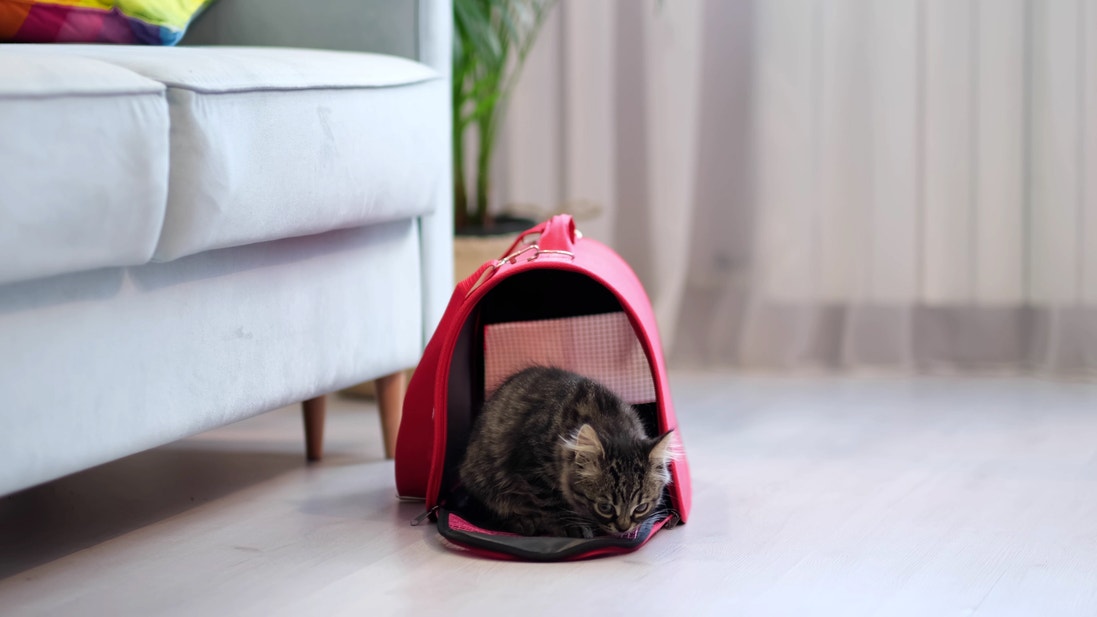
Bringing a Kitten Home
Bringing a kitten home is an exciting and emotional time for both you and your new family member. You may be nervous about how your new cat or kitten will adapt to an unfamiliar environment and new faces. It is also natural for your new furry friend to feel some anxiety while transitioning from their former home to yours. Preparing for this joyful occasion in advance will help you and your cat relax and begin to enjoy each other more quickly. In this article, we recommend practical considerations to help make your new cat’s arrival in your household a positive, happy experience for both of you. We will discuss first introductions, feeding suggestions, and provide tips on how to settle your new kitten in smoothly.
Are you worried about how to bring a kitten home in the car in the safest way that prevents them from becoming carsick(open in new tab)? Our other articles cover all these topics and more.
How to prepare your home before bringing a kitten or new cat home
Bringing your kitten home can be an overstimulating and scary time for your new addition. This is why creating a safe and welcoming environment is key to ensuring they feel calm, comfortable and adjust quickly to their new surroundings and family. In this article, we will cover everything you need to know about bringing kittens home so that you can provide the smoothest transition.
Create a safe, enclosed space for your cat’s first days
Before taking home a kitten, you should have already prepared a safe, warm and enclosed space for their first few days with their new family. We advise picking a low-traffic room as your starter base. Make sure it is free from loud noises and any dangerous objects so they can settle in quietly. Do not make any introductions to other pets or children yet; your new kitten needs to settle in first. This room should have all its essential items, including their food and water bowls, bedding, litter tray and toys.
When considering the position of the litter tray it is important to remember to place the litter tray as far away as possible from the food and water bowls. Cats are naturally very clean and don't like to toilet near their food or water source!
Make the space comfortable for your new cat
The designated room you are bringing a kitten home to should include soft bedding, warm areas and hiding spots, such as a box. Soft bedding is important to make sure they feel comfortable and cosy, and hiding places provide that extra security they need while they adjust to their new surroundings. Adding vertical spaces, such as a cat tree and scratching post, will also give them more peace of mind and allow them to mark their scent in their new environment. They also need kitten-safe toys for stimulation and play.
Remove potential hazards around the home
Bringing kittens home also requires the identification and removal of potential hazards and common dangers. When kitten-proofing your home, you should always hide electrical wires, small choking hazards, sharp objects and potentially toxic plants or cleaning products. Toilet lids should be closed, drawers, cupboards, windows, doors, bin lids, and balconies should also be secured. Small areas where they may become trapped should also be addressed. Human food should also be sealed and removed from curious paws. Closing doors to the outside and considering hazards in the garden, should the kitten get out without supervision, is also important. Things like toxic plants, ponds, garden chemicals and tools should all be addressed and made safe.
What to expect when bringing kittens home
Before taking home a kitten, you should get a cat carrier to make the ride home a little more homely for your new friend. Spraying your cat carrier with synthetic feline hormones 1 day prior to travelling will reassure and soothe your cat/kitten during that first journey. Favour a cat carrier that opens from the top, as it is more user-friendly.
The smell of an old toy or blanket from her previous owner may also reduce your cat’s initial anxiety. Indeed, travelling, new smells and foreign noises will contribute to making your cat feel scared and uneasy. A perfectly natural response is yowls; so, do not overreact, try to just limit the stimulation.

The first 24 Hours: Helping your cat settle in
Bringing a new cat home is a big milestone for the whole family; their first day is incredibly important, and any setbacks could make them withdraw until they feel safer. Always remember to be patient with them; some cats or kittens may take longer to settle in and come out of their shell. Do not force them out of their carrier or push them to be social if they are hiding away; they will make their introductions on their own time. Formal introductions to household members, such as children and pets, should be made slowly; they should not be introduced to children and other animals straight away. Your kitten needs to get used to their scents without being forced to share spaces with them, so items of clothing placed around their designated room are a great idea. Interactions should be made gradually and should always be supervised.
Let them explore slowly
When bringing a new cat or kitten home, it is also important to let them explore their surroundings slowly. Gradually introduce them to the rest of the home and always make sure they are supervised at all times. Begin by letting them get used to the adjacent area to the room they have become familiar with, then open other doors so they can explore at their own pace. It also helps to put items with their scent on them around the new areas they are getting used to. Make sure you provide hiding spots in case they become overwhelmed. All areas of the home and garden should also be kitten-proofed at this stage.
Introducing them to the litter tray, food & water
Ideally, before taking a kitten home, you should find out what your kitten was eating in their previous home, so you can stick to this diet. This familiarity will help them settle in faster. Pick a litter tray that is designed for kittens and a kitten-safe litter that is soft on tiny paws. Always feed kittens complete and balanced kitten food that is formulated with all of the nutrients, vitamins and minerals, in just the right amounts. This ensures kittens can grow strong and healthy.
Not sure how much to feed kittens(open in new tab)? Check out our other articles for the best advice. They generally need 4 small meals a day and access to lots of fresh water.
Playing and bonding without overwhelming
Bringing kittens home also means lots of playtime. We advise that you keep play sessions short and use a variety of interactive toys to encourage bonding without them becoming overwhelmed. Kittens may test your boundaries during play, so always be patient with them. Using toys made for kittens also helps make sure they don’t hurt themselves.
Tips for the first week: Helping your cat settle long-term
When bringing a kitten home it is best to establish routines for feeding, sleeping, playtime and litter cleaning. Cats and kittens thrive on routine, and this consistency will help them settle in as quickly as possible. Try and feed them 4 small meals a day at the same time, you should also try and clean their litter tray at the same time every day and play with them around the same time also. Helping remove distractions, light and noise when you want them to sleep will also help maintain a regular sleeping schedule. Think of this as a bedtime ritual.
You should always observe new kittens for signs of stress or health issues, such as sneezing or coughing, gastrointestinal issues, diarrhoea, breathing issues and lethargy. A stressed kitten will withdraw and hide away. This is normal when they are first getting used to new surroundings, but if it continues for an extended period of time, you may want to book a vet visit. Meanwhile, making them as comfortable as possible by following our previous guidelines should help alleviate any signs of stress. You will also want to arrange for them to be vaccinated, microchipped and registered with your local vet.
Our other articles can also help you gauge how much sleep a kitten needs, so you know what is normal and what may be a cause for concern.
What to buy before bringing a kitten home
Bringing a new cat or kitten home requires lots of preparation beforehand, we have put together a handy list to help you gather all the essential items with ease.
- Kitten food
- Water bowls and food bowls
- Litter tray
- Litter
- Kitten toys
- Kitten bedding, bed and boxes
- Cat carrier
- Scratching posts
- Grooming supplies
- First vet check booked
